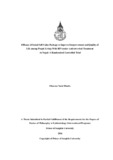Please use this identifier to cite or link to this item:
http://archive.nnl.gov.np:8080/handle/123456789/57Full metadata record
| DC Field | Value | Language |
|---|---|---|
| dc.contributor.author | Bhatta, Dharma Nand | |
| dc.date.accessioned | 2017-12-21T09:28:55Z | |
| dc.date.accessioned | 2020-08-21T07:26:48Z | - |
| dc.date.available | 2017-12-21T09:28:55Z | |
| dc.date.available | 2020-08-21T07:26:48Z | - |
| dc.date.issued | 2017-12-21 | |
| dc.identifier.uri | http://103.69.125.248:8080/xmlui/handle/123456789/57 | - |
| dc.description | A Thesis submitted in partial fulfillment of the requirements for the Degree of Doctor of Philosophy in Epidemiology (International Program), Prince of Songkla University, 2016. | en_US |
| dc.description.abstract | Empowerment is a means of dealing with troubles of relatively incapable peoples and by mediating the role susceptibility plays in making and facilitating social anxieties. It is a cost effective response to enhance individuals in the societal system. It helps to achieve structural factors including political, environmental, economic and social obstacles. Social self-value package was the empowerment intervention, an education program that targeted on autonomy, selfesteem, self-care, social and family adjustment, and human and health right. The primary aim of this study was to assess the effectiveness of the intervention to improve empowerment and quality of life among people living with HIV. Secondary aim was to examine the reduction in stigma and improvement in social support. Open label, parallel, randomized controlled trial was conducted at the antiretroviral treatment (ART) center of Nepal from September 2014 to June 2015. HIV infected participants receiving ART from six to twenty four months, and was aged 18 years and above, were randomly assigned to receive either control or intervention group. Allocation concealment was done by using sequentially numbered opaque sealed envelopes. Six weeks intervention was led by two public health professionals. Face-to-face interview was carried out to collect data among 132 (intervention n = 66 and control n = 66) participants and was followed up at 3- and 6- months after the baseline. Feasibility and acceptability of the intervention was measured by using both qualitative and quantitative techniques. Significant differences within the group by time were analyzed using appropriate tests included chi-square or Fisher exact test or Wilcoxon signed-rank test. Mean score within the group by time for empowerment, QoL, stigma and social support was measured. Effectiveness of the intervention package was analyzed using Difference in Difference (DiD) and mixed-effect non-linear regression. Among 1447 screened HIV infected people, 66 were taken for intervention and tested intervention acceptability between September and November 2014. For the acceptability, mean age of the participants was 36.4 years, 47% were female, and 30.3% had higher secondary and above level education. Significant change was found between pre- and post-test score of attitude towards HIV related issues in each session. Participants’ acceptability and satisfaction reveals higher after the end of the all sessions. Qualitative approach detected similar findings from both participants and counselors. At the baseline mean age of the participants was 36.1 (SD = 7.8) years, 47% were male, 43.9% were indigenous, and 71.2% had primary to higher level of education. More than half of participants diagnosed with HIV before their 33 birthdays and majority were infected through sexual contact. Baseline demographic and clinical characteristics were not significantly different in control and intervention group. The mean scores of empowerment, QoL and social support were increased and the stigma score was reduced in the intervention group compared to the control group at 3- and 6- months. An intervention effect was significantly increased in empowerment, QoL and social support and reduced in stigma scores by time in intervention group. No unfavorable events were detected during study period. Social self-value intervention package was found to be acceptable and effective to improve empowerment, QoL, social support and reduce stigma. | en_US |
| dc.language.iso | en | en_US |
| dc.subject | HIV -- Nepal | en_US |
| dc.subject | Acquired Immuno-deficiency Syndrome | en_US |
| dc.subject | ART | en_US |
| dc.subject | Quality of life | en_US |
| dc.subject | Intervention | en_US |
| dc.title | Efficacy of social self-value package to improve empowerment and quality of life among people living with HIV under antiretroviral treatment in Nepal: a randomized controlled trial | en_US |
| dc.type | Thesis | en_US |
| Appears in Collections: | 300 Social sciences | |
Files in This Item:
| File | Description | Size | Format | |
|---|---|---|---|---|
| Thesis_Dharma.pdf | 8.25 MB | Adobe PDF |  View/Open |
Items in DSpace are protected by copyright, with all rights reserved, unless otherwise indicated.